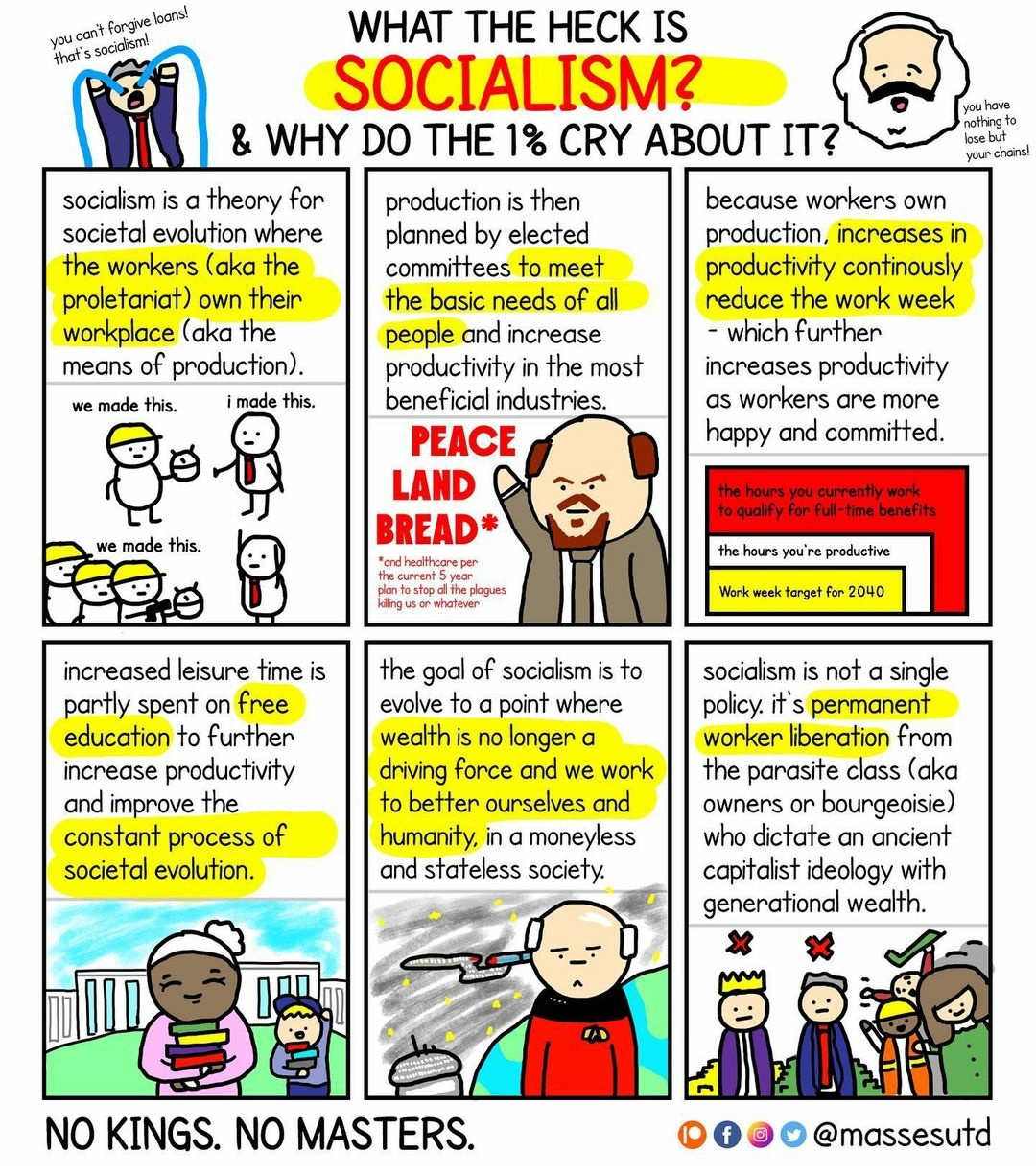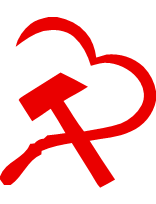Lefty Memes
An international (English speaking) socialist Lemmy community free of the "ML" influence of instances like lemmy.ml and lemmygrad. This is a place for undogmatic shitposting and memes from a progressive, anti-capitalist and truly anti-imperialist perspective, regardless of specific ideology.
Serious posts, news, and discussion go in c/Socialism.
If you are new to socialism, you can ask questions and find resources over on c/Socialism101.
Please don't forget to help keep this community clean by reporting rule violations, updooting good contributions and downdooting those of low-quality!
Rules
0. Only post socialist memes
That refers to funny image macros and means that generally videos and screenshots are not allowed. Exceptions include explicitly humorous and short videos, as well as (social media) screenshots depicting a funny situation, joke, or joke picture relating to socialist movements, theory, societal issues, or political opponents. Examples would be the classic case of humorous Tumblr or Twitter posts/threads. (and no, agitprop text does not count as a meme)
1. Socialist Unity in the form of mutual respect and good faith interactions is enforced here
Try to keep an open mind, other schools of thought may offer points of view and analyses you haven't considered yet. Also: This is not a place for the Idealism vs. Materialism or rather Anarchism vs. Marxism debate(s), for that please visit c/AnarchismVsMarxism.
2. Anti-Imperialism means recognizing capitalist states like Russia and China as such
That means condemning (their) imperialism, even if it is of the "anti-USA" flavor.
3. No liberalism, (right-wing) revisionism or reactionaries.
That includes so called: Social Democracy, Democratic Socialism, Dengism, Market Socialism, Patriotic Socialism, National Bolshevism, Anarcho-Capitalism etc. . Anti-Socialist people and content have no place here, as well as the variety of "Marxist"-"Leninists" seen on lemmygrad and more specifically GenZedong (actual ML's are welcome as long as they agree to the rules and don't just copy paste/larp about stuff from a hundred years ago).
4. No Bigotry.
The only dangerous minority is the rich.
5. Don't demonize previous and current socialist experiments or (leading) individuals.
We must constructively learn from their mistakes, while acknowledging their achievements and recognizing when they have strayed away from socialist principles.
(if you are reading the rules to apply for modding this community, mention "Mantic Minotaur" when answering question 2)
6. Don't idolize/glorify previous and current socialist experiments or (leading) individuals.
Notable achievements in all spheres of society were made by various socialist/people's/democratic republics around the world. Mistakes, however, were made as well: bureaucratic castes of parasitic elites - as well as reactionary cults of personality - were established, many things were mismanaged and prejudice and bigotry sometimes replaced internationalism and progressiveness.
- Absolutely no posts or comments meant to relativize(/apologize for), advocate, promote or defend:
- Racism
- Sexism
- Queerphobia
- Ableism
- Classism
- Rape or assault
- Genocide/ethnic cleansing or (mass) deportations
- Fascism
- (National) chauvinism
- Orientalism
- Colonialism or Imperialism (and their neo- counterparts)
- Zionism
- Religious fundamentalism of any kind
view the rest of the comments

Question. How can we be sure to trust that the elected committees do not turn society into an authoritarian regime? Would it work like standard western democracy, i.e. electing a party / parties to form a "government" (in this case committee; semantics)?
Edit: I truly appreciate everybody who takes the time to write elaborate answers pertaining to my question. I will read and respond once I have the opportunity and in that case, I hope eventual followup questions are welcomed. :)
The key is in one of the words you've said:
You don't have to trust that they won't turn authoritarian. If you see authoritarian tendencies and you don't like them, you vote them out.
That depends on who you ask. An anarchist will tell you no, a communist will tell you a different answer, etc. I'm a Marxist-Leninist so I'll answer to that as a Marxist-Leninist.
In a Marxist-Leninist state, there is only one party. In the same way that your country only have one justice system, your country only has one socialized system of healthcare (if at all), etc, there would be need only for one party: the party that represents the interests of the workers. This party would have a vanguard of communist intellectuals (liable to being removed from their position by popular vote), who would be in a constant back-and-forth democratic dialogue with the workers and their representation in worker-councils. The needs and demands of the workers would be translated to Marxist ideology, which is flexible depending on the circumstances, the culture, and the society it's applied to, and policy would be drafted, approved and adopted.
A good example of this in action is detailed in a book called "how the workers' parliaments saved the Cuban Revolution", by Pedro Ross. It details the immense level of popular participation in the drafting, approval, implementation and execution of policy in Cuba during the 1990s "periodo especial", a huge economic crisis precipitated by the dissolution of their biggest trading partner, the USSR. Literal millions of people, through their unions and through worker councils, participated democratically in deciding which sectors of the economy they wanted to preserve most, which ones least, which workers are redundant and which aren't, which goods and services should be prioritised in the planned economy, how to organize local organic farms everywhere (including workplaces) in order to minimize food imports... All of this happened in a back-and-forth, multi-year exercise, between the top representatives of the government, the specialists (e.g. economists, hospital directors, transit company directors, etc.), and the direct representatives of the people through the worker's councils. It's truly one of the most explicit and overwhelming examples of democracy that I've ever encountered.
That sounds like a fascinating book! I've always been interested in the nitty gritty of how the Cuban democratic process works, and this book seems accessible and is just under 200 pages (not including the appendices/bibliography) so I might actually get through it.
Here's a temporary download if anyone wants to grab it (it's also just on libgen if you prefer to find it yourself)
Thanks for posting the link!
Rather than a dry, aseptic description of the Cuban institutions and form of government, the book reads as a historical account of the process that took place in the years of the Periodo Especial.
The second half of the book, for some reason, is a recount of the Cuban revolution and its historical causes, which you may or may not skip reading depending on what your purpose is with the book.
Thanks for providing a link!